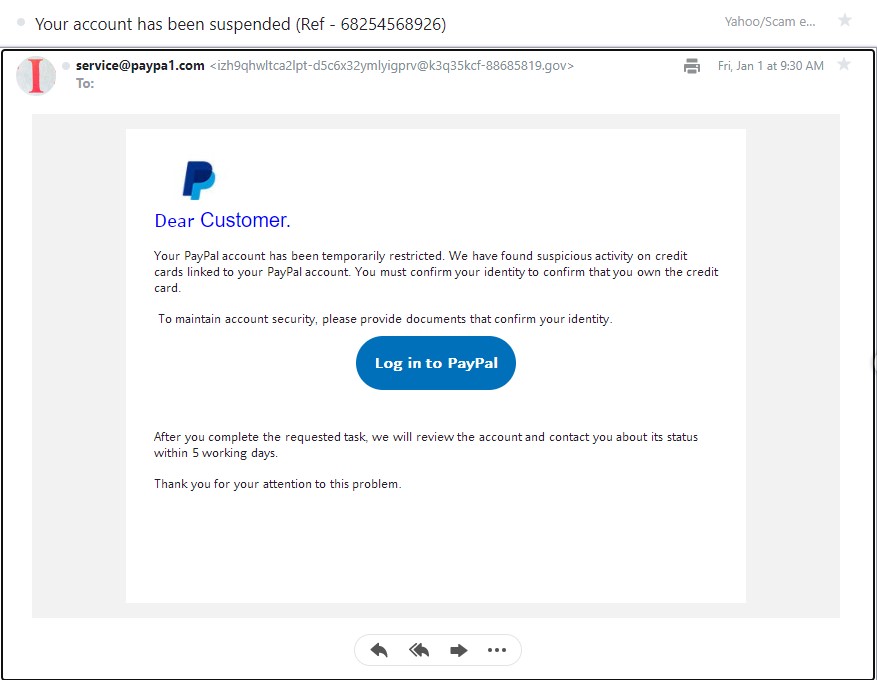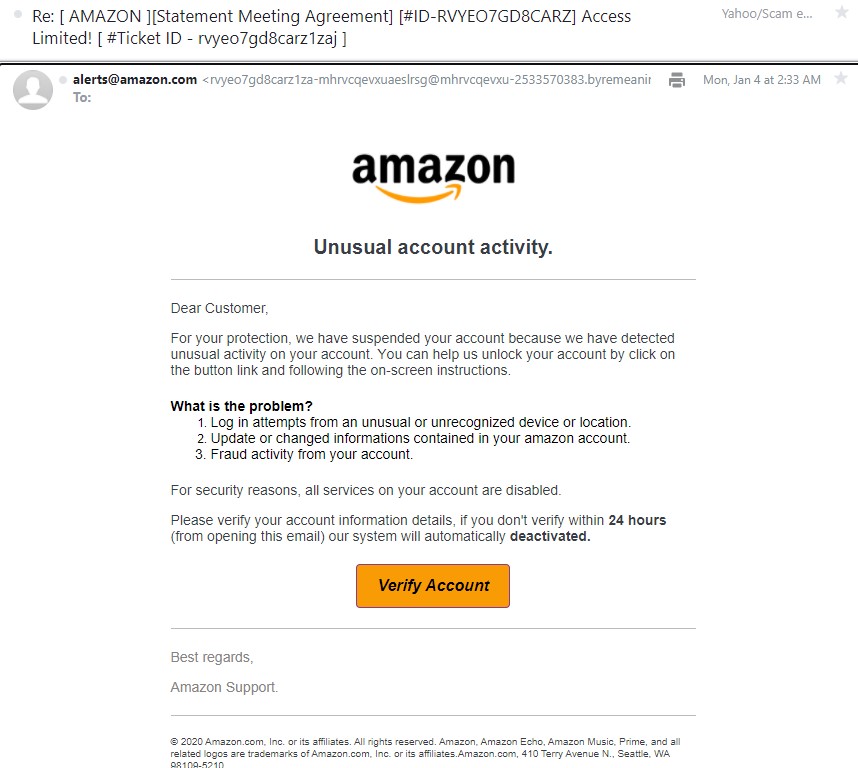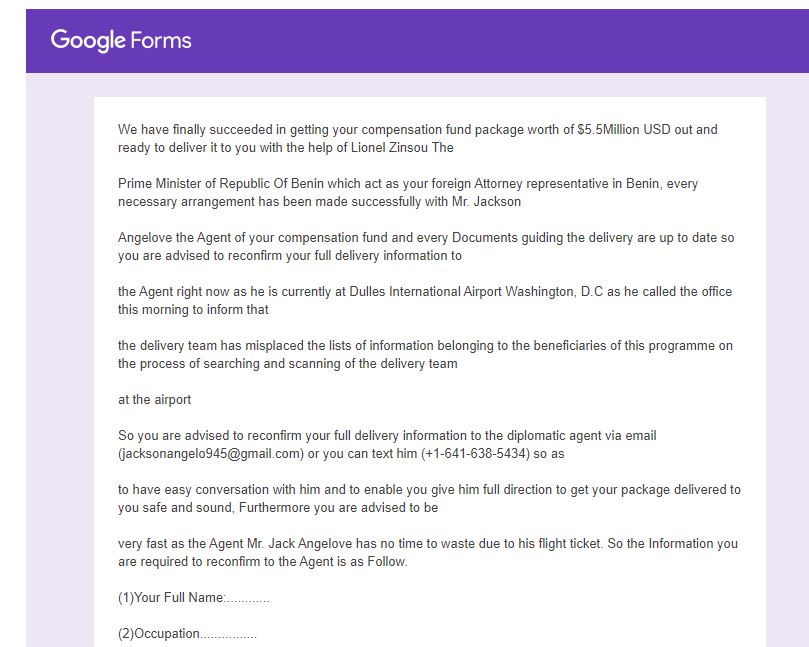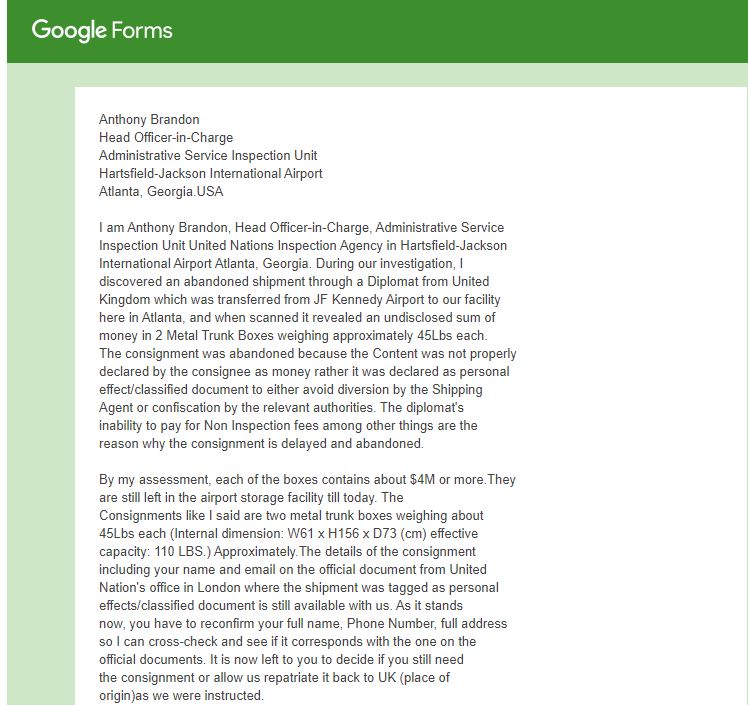New Year, Same Scams
I am back folks and we are in a brand new year! Welcome to 2021! With a brand new year, that means all bad things including scams automatically come to an end right? I certainly showcased a lot of scams last year especially ones I started receiving saying that I would be getting large sums of money from people I’ve never heard of in my life. You can read about some of those by clicking here.
Even though it’s a new year, still have the same scams. I’m gonna be taking a closer look at some of the most recent scams I’ve received such as one claiming to be from PayPal, another one claiming to be from Amazon, and a few others that promise I’ll be getting millions of dollars……as long as I give out certain information.
Classic PayPal Scam
On January 1st, I received an email stating that my PayPal account had been suspended. What a way to start the new year, right? That’s definitely not something you want to hear at the beginning of the year and so receiving an email like this would likely cause me to panic, but I didn’t and I will go over why I didn’t panic upon receiving this email.
There is always a common theme with PayPal email scams and it is to get you to think something is seriously wrong with your account. They’ll say things like your account being temporarily restricted because of suspicious activity found on credit cards linked to your PayPal account or a very expensive package was ordered through your PayPal account and they want to confirm it’s you.
In this case, I ended up receiving one that said I had suspicious activity on credit cards linked to my account. I know this is completely false because I have no credit cards on my actual PayPal account so I knew this email is a scam. There are also other clues in this email letting you know it’s a scam.
One of the best and most reliable ways to tell an email is a phishing scam is to check the email address it came from. I’ve talked about this a lot in my past articles of scam emails, but it is always worth repeating. A legitimate email address will always have @paypal.com in it. The email address here is this instead:
As you can see, the address resembles nothing like an actual PayPal email address. This just looks like nothing but random numbers and letters thrown together. Now what can through people off here is that at the top where the real email address is listed, to the left of it is what says service@paypal.com and this is what you’ll first see when you scroll through your inbox. The scammers try to make it look like it truly is from PayPal by using this method and PayPal typically does send actual emails that show the service@paypal.com. The key difference here though is that PayPal will only do it to let you know about a transaction that you’ve recently authorized, not to let you know that something is wrong with your account.
The scammers make a noticeable mistake here though. It shows as service@paypa1.com which PayPal themselves would never use because they would not have spelling error like that. Why the scammers used a 1 instead of an l is beyond me, but that’s another big hint that this is a phishing scam.
One thing that I will have to say that is interesting about this phishing email is that inside of it, they want me to provide documents to confirm my identity. PayPal would never ask for documents of any kind to confirm who you are and another thing is that this email does not specifically say what kind of documents need to be provided. That’s a huge red flag right there alone.
Another thing that I’ve talked about in these type of emails are the spelling errors that are usually found, but in this case, there are very few with the one exception I talked about above. This shows to me that the scammers are getting better at correcting their spelling and grammatical mistakes before sending out these kind of emails.

Now the one thing you need to avoid most of all from this scam is clicking the link inside of it. Clicking the link inside these kind of emails will take you to a site designed to mimic the real PayPal site, but it will actually steal your login information if you try to login with your actual PayPal credentials. In this case, when I click the link, it goes to a dead url which most likely indicates that this email was reported to PayPal and subsequently shut down.
What the scammers hope for is that you check your email very often so that way when you see a disturbing email such as the one I received, the hope for them is that you’ll panic, open the email quickly and then click the link inside bringing you to their fraudulent website so they can steal your information before the site is reported and shut down.
Now that you know what to look for, you can avoid these type PayPal phishing email scams and can even report them to PayPal itself as they have an email address that you can forward phishing scams to. Let’s take a look at a similar scam I received a few days later only this time, it claims to be from another company.
Amazon Scam Joins The Ranks
A few days after I received the PayPal phishing scam, I noticed an email that claims to be from Amazon was in my inbox. Of course, upon closer inspection I could tell that it wasn’t a legitimate email from Amazon. The subject line of the email just seemed way too strange and had too many things in it that just didn’t make any sense.
It has a lot of things in brackets that taken together as a whole makes it nearly impossible to comprehend. What the heck is [Statement Meeting Agreement]? Then in brackets next to it, it has an ID number that looks like this: [#ID-RVYEO7GD8CARZ]. After that it says access limited and then supposedly some kind of ticket ID number in brackets.
I can tell you for a fact that Amazon would never send something like this, especially with what it said in the subject line as it doesn’t make any sense. While I have used my actual Amazon account recently, I know that there hasn’t been any hint of unusual activity on it so I know this email is bogus.
Let’s talk about the email address that this email came from. Upon first inspection of it from my inbox it says alerts@amazon.com. When clicking inside the email, however, you easily see that at the top, the actual email address it came is not an Amazon address at all. In fact, the email address is so long that you can’t see the entire thing. I have never seen such an email address and it makes me wonder why scammers continue to send these out from these bogus type of emails when people can easily check them.
Now there’s not a lot of grammatical or spelling errors present in this email except for a slight one. The sentence that says “You can help us unlock your account by click on the button link and following the on-screen instructions“. The part where it says “by click on the button”, should say “by clicking on” so that it way it makes more sense. That might not be noticeable to some people, but it definitely was notable to me and raised a red flag.

The next thing the scammers want you to do is to click the link inside the email so that you can be taken to their fraudulent website in the hopes that you will try to log in with your real Amazon credentials so that they can copy it, log into your real Amazon account start doing real damage.
This why it’s important never to click links inside emails like these because they are trying to steal your information which can cause you to suffer financial damage. I know I’ve talked a lot about this and I may seem like a broken record, but I really don’t want anyone to fall for these scams because people fall for them a lot and the scammers know this which is why they continue to send out these type of phishing emails. Now, let’s take a look at another type of email I’ve been receiving that’s also a major scam.
Happy New Year! Millions of Dollars I’m Owed?!
I’ve only recently talked about this particular type of email scam that I’ve suddenly started receiving. I’ve got a link at the top of this article that will take you to them. Needless to say, I’ve started receiving quite a bit more of these lately and it is worrisome to me because it means that people are falling for these scams even though they’ve actually been around for a long time.
The first one that I want to go over actually came in on January 1st. It starts out by saying that they’ve finally succeeded getting my compensation fund package that’s worth over $5.5 million and that it is now ready to be delivered to me with the help of someone by the name of Lionel Zinsou who is the Prime Minister of Republic of Benin.
Do you already see what is wrong with this? Why would the Prime Minister of some country you probably have never heard of, want to help deliver over $5 million to me? If I were him, I probably would’ve kept that money for myself. This raises a very big question. What did I even do to deserve this money? It’s not like a played a lottery or anything and why would people from another country want to help me? It almost sounds like they want to launder money illegally instead.
This email gets even better! It says that every necessary arrangement has been made successfully by someone with the name of Mr Jackson. Who the heck is that?! Next it says that there is an agent by the name of Angelove who is at Dulles International Airport at Washington D.C. and has said that this agent has called the office to inform everyone that the delivery team has misplaced the lists of information that belong to the beneficiaries of this program.

Because of this, I’m supposed to reconfirm my full delivery information to the diplomatic agent via email or I can text this person at an international number so that I can have easy conversation with him to enable the package to be delivered to me safe and sound. Now, I’m also supposed to do this very fast as the agent has no time to waste due to his flight ticket. So the information I’m supposed to give him are as follows: My full name, occupation, mobile phone number, current home address, fax number (which practically no one has anymore), country, city, nearest airport, and a copy of my id that has to be attached.
What’s also quite interesting is that there is a link at the bottom of the email that says “Fill out Form”. It’s supposed to be a Google docs form. I’d be very wary of clicking that link as you truly don’t know what it might contain such as malware and viruses. Of course, I would think that this entire email would have been laughable long before you’ve gotten to that link. In no way, shape, or form would I dare to give out any of that information that they would require and if that information was accidentally lost, I would think that they would have a copy of it somewhere else for easy backup use. In no way would I even contemplate giving what they’re asking for. Let’s take a look at another one.
An Abandoned Package Containing Money
This one takes the cake and is probably the most laughable one I’ve received yet. Someone by the name of Anthony Brandon who is the Head Officer-in-Charge of Administrative Service Inspection Unit of the United Nations Inspection Agency in Hartsfield International Airport in Atlanta, Georgia, has sent me this email. Did you get all of that?
He’s contacted me because apparently during an investigation, he discovered an abandoned shipment through a Diplomat from the United Kingdom and was transferred from JFK Airport to their facility in Atlanta and when it was scanned, it revealed an undisclosed sum of money in two metal trunk boxes weighing approximately 45lbs each. The diplomat apparently couldn’t pay inspection fees and decided to abandon it.
I find this extremely funny because if a diplomat were carrying that much money from the UK, I would certainly think the country’s government would give this diplomat more than enough money to cover any fees necessary to transport any kind of money.

By Anthony Brandon’s assessment, each of the boxes contain $4 million or possibly more. Also, it looks like they found official documentation from the United Nations office in London that this was supposed to be delivered to me. So, I need to reconfirm my full name, address, and phone number so that it can be cross-checked and see if it corresponds with the one on the official documents.
I wish you could see how hard I laughed as I was reading all of this. There’s no way such a thing would actually happen and no diplomat from another country would deliver such a large amount of money to me. The email doesn’t even address me by name so how could they truly know this was meant for me?! See how crazy this is? There’s also a button at the end of this email which if you click on, will supposedly bring you to the form that they want you to fill out. Needless to say I did not click it or go any further with this email.
Emails That Play On Your Emotions
I’ve now given you two examples each of emails saying that something is wrong with your account and emails that say you are due large sums of money, but that they need information from you first. Now even though they are different in what they are trying to get from you, the ultimate goal is the same.
These emails are designed to play with your emotions. One is trying to scare you into thinking something is seriously wrong with your real account whether it be PayPal or Amazon, and the other is trying to get you excited at the possibility that you’re going to receive large sums of money.
The hope is that your emotions will get the best of you so that you won’t be thinking logically and will give exactly what these scammers are looking for. In the case of the PayPal and Amazon scams, they’re trying to get your actual login information to the real sites while the other emails, are trying to get your personal information to either cause identity theft or gain access to your financial accounts such as bank accounts or more.
NEVER give out information to any one of these kinds of emails and never click the links inside of them. Do not give the scammers what they want. If it sounds too good to be true, then you want to stay away from them. If you’re really worried about your Amazon account or PayPal account, open a separate web browser and go to the actual urls of those sites. Odds are, you’ll log in and find that nothing is wrong with your accounts.
As for the money emails, you want to think logically. How would these people get your information and suddenly say that you are due to receive large sums of money? If they truly know you, why aren’t they addressing you by name and why would diplomats be involved in getting you large amounts of money? Sorry, but hardly anyone gets money for doing nothing (unless inherited) and to get millions of dollars like that? Nope, don’t buy it all. Even to win the lottery, you still have to do something in order to have the slimmest chances of hope of getting large amounts of money. Don’t let your emotions get the best of you.

